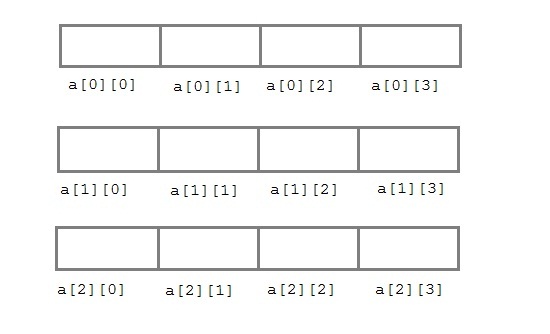Arrays
In C language, arrays are reffered to as structured data types. An array is defined as finite ordered collection of homogenous data, stored in contiguous memory locations.
Here the words,
- finite means data range must be defined.
- ordered means data must be stored in continuous memory addresses.
- homogenous means data must be of similar data type.
Example where arrays are used,
- to store list of Employee or Student names,
- to store marks of a students,
- or to store list of numbers or characters etc.
Since arrays provide an easy way to represent data, it is classified amongst the data structures in C. Other data structures in c are structure, lists, queues and trees. Array can be used to represent not only simple list of data but also table of data in two or three dimensions.
Declaring an Array
Like any other variable, arrays must be declared before they are used. General form of array declaration is,
data-type variable-name[size]; for example : int arr[10];

Here int is the data type, arr is the name of the array and 10 is the size of array. It means array arr can only contain 10 elements of int type. Index of an array starts from 0 to size-1 i.e first element of arr array will be stored at arr[0] address and last element will occupy arr[9].
Initialization of an Array
After an array is declared it must be initialized. Otherwise, it will contain garbage value(any random value). An array can be initialized at either compile time or at runtime.
Compile time Array initialization
Compile time initializtion of array elements is same as ordinary variable initialization. The general form of initialization of array is,
type array-name[size] = { list of values };
int marks[4]={ 67, 87, 56, 77 }; //integer array initialization
float area[5]={ 23.4, 6.8, 5.5 }; //float array initialization
int marks[4]={ 67, 87, 56, 77, 59 }; //Compile time error
One important things to remember is that when you will give more initializer than declared array size than the compiler will give an error.
#include<stdio.h>
#include<conio.h>
void main()
{
int i;
int arr[]={2,3,4}; //Compile time array initialization
for(i=0 ; i<3 ; i++) {
printf("%d\t",arr[i]);
}
getch();
}
Output
2 3 4
Runtime Array initialization
An array can also be initialized at runtime using
scanf() function. This approach is usually used for initializing large array, or to initialize array with user specified values. Example,#include<stdio.h>
#include<conio.h>
void main()
{
int arr[4];
int i, j;
printf("Enter array element");
for(i=0;i<4;i++)
{
scanf("%d",&arr[i]); //Run time array initialization
}
for(j=0;j<4;j++)
{
printf("%d\n",arr[j]);
}
getch();
}
Two dimensional Arrays
C language supports multidimensional arrays. The simplest form of the multidimensional array is the two-dimensional array.
Two-dimensional array is declared as follows,
type array-name[row-size][column-size] Example : int a[3][4];

The above array can also be declared and initialized together. Such as,
int arr[][3] = {
{0,0,0},
{1,1,1}
};
Run-time initialization of two dimensional Array
#include<stdio.h>
#include<conio.h>
void main()
{
int arr[3][4];
int i,j,k;
printf("Enter array element");
for(i=0;i<3;i++)
{
for(j=0; j < 4; j++)
{
scanf("%d",&arr[i][j]);
}
}
for(i=0; i < 3; i++)
{
for(j=0; j < 4; j++)
{
printf("%d",arr[i][j]);
}
}
getch();
}
No comments:
Post a Comment